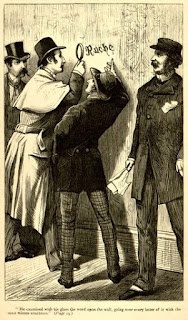A
Study in Scarlet es una novela de detectives del
británico Arthur Conan Doyle. Fue
escrita en 1886 y marca la primera aparición de Sherlock Holmes y el doctor
Watson, que se convertirían en los más famosos personajes de ficción. A Study In Scarlet fue el primer trabajo
de ficción en introducir la lupa como
herramienta investigativa.
En los párrafos de abajo (en inglés) el autor cuenta
su experiencia en el ejército del Imperio
Británico en India y Afganistán,
donde es herido. Para recuperarse es devuelto a Londres donde encuentra que empieza aquedarse sin fondos y debe
adaptarse…
En vocabulario encontramos grazed, Ghazis, rallied, bask, kith nor
kin, y cesspool
Al final aclaramos el término medical orderly y también
patient care assistant y Certified
Nursing Assistant
… IN the year 1878 I took my degree of Doctor of Medicine of the University of London, and proceeded to Netley to go through the course prescribed for surgeons in the army. Having completed my studies there, I was duly attached to the Fifth Northumberland Fusiliers as Assistant Surgeon. The regiment was stationed in India at the time, and before I could join it, the second Afghan war had broken out. On landing at Bombay, I learned that my corps had advanced through the passes, and was already deep in the enemy’s country. I followed, however, with many other officers who were in the same situation as myself, and succeeded in reaching Candahar in safety, where I found my regiment, and at once entered upon my new duties.
 |
| Holmes with magnifying glass |
The campaign brought honours and promotion to many,
but for me it had nothing but misfortune and disaster. I was removed from my
brigade and attached to the Berkshires, with whom I served at the fatal battle
of Maiwand. There I was struck on the shoulder by a Jezail bullet, which shattered the bone and grazed the subclavian artery. I should have
fallen into the hands of the murderous Ghazis had it not been for the devotion and
courage shown by Murray, my orderly, who threw me across a
pack-horse, and succeeded in bringing me safely to the British lines.
 |
| Pashtun fighters with their jezails |
Worn with pain, and weak from the prolonged
hardships which I had undergone, I was removed, with a great train of wounded
sufferers, to the base hospital at Peshawar. Here I rallied, and had already improved so far as
to be able to walk about the wards, and even to bask a little upon the verandah, when I was struck
down by enteric fever, that curse of our Indian possessions. For months my life
was despaired of, and when at last I came to myself and became convalescent, I
was so weak and emaciated that a medical board determined that not a day should
be lost in sending me back to England. I was dispatched, accordingly, in the
troopship “Orontes,” and landed a month later on Portsmouth jetty, with my
health irretrievably ruined, but with permission from a paternal government to
spend the next nine months in attempting to improve it.
I had neither kith nor kin in England, and was therefore as free
as air—or as free as an income of eleven shillings and sixpence a day will
permit a man to be. Under such circumstances, I naturally gravitated to London,
that great cesspool
into which all the loungers and idlers of the Empire are irresistibly drained.
There I stayed for some time at a private hotel in the Strand, leading a
comfortless, meaningless existence, and spending such money as I had,
considerably more freely than I ought. So alarming did the state of my finances
become, that I soon realized that I must either leave the metropolis and
rusticate somewhere in the country, or that I must make a complete alteration
in my style of living. Choosing the latter alternative, I began by making up my
mind to leave the hotel, and to take up my quarters in some less pretentious
and less expensive domicile… (Paragraphs from A
Study in Scarlet, by Arthur
Conan Doyle)
Vocabulario
Graze: to break the surface of
the skin by rubbing against something rough:
He fell down and grazed his knee.
Ghazi: A ghazi
was an individual who participated in ghazw,
meaning military expeditions or raiding.
Rallied: to return to a better
condition:
The nurse said my mother had rallied after a poor night.
Bask: to lie or sit enjoying
the warmth especially of the sun.
Kith and kin: people you are
connected with, especially by family relationships.
Cesspool: a large underground
hole or container that is used for collecting and storing solid waste, urine,
and dirty water.
Para
saber
Medical
orderly (ward
assistant o nurse assistant) es
un trabajador de hospital cuyo trabajo consiste en asistir a médicos y
enfermeras con variadas intervenciones. Sus obligaciones van desde asistir a
detener a pacientes combativos hasta afeitarlos.
En los Estados
Unidos los orderlies han sido
eliminados de los hospitales y sus funciones reemplazadas por los patient care assistant y Certified Nursing Assistant.
Artículos
relacionados
… recuerda las características de Sherlock y la
mujer, quizá la única, que logró atraerlo… Sherlock
Holmes
… escribió esta historia poco después de llegar de Sud África, donde había estado como médico… The Hound of the Baskervilles
Cada línea que he escrito desde 1936 ha sido escrita, directa o indirectamente, CONTRA el totalitarismo y POR el socialismo democrático… Por qué escribo
Si
te gustó esto compartílo con tus amigos
No hay comentarios:
Publicar un comentario
Deja aquí tus mensajes, comentarios o críticas. Serán bienvenidos